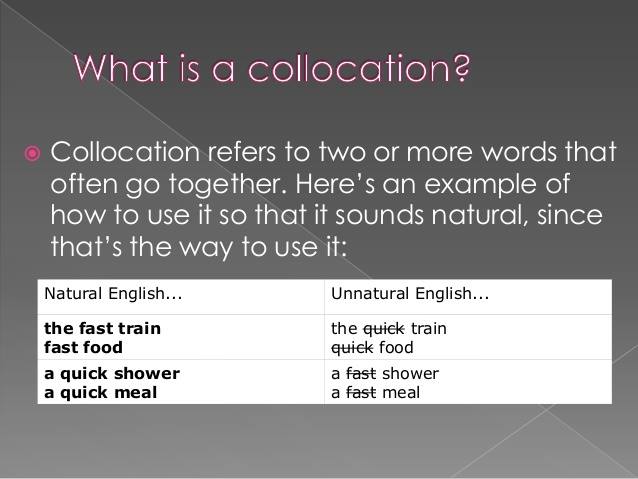
A collocation is two or more words that often go together. These combinations just sound “right” to native English speakers, who use them all the time. On the other hand, other combinations may be unnatural and just sound “wrong”.
Some common verbs are listed below to assist you with the activity:
Collocation with HAVE:
have a bath
have a drink
have a good time
have a haircut
have a holiday
have a problem
have a relationship
have a rest
have lunch
have sympathy
Collocations with DO:
do nothing
do someone a favour
do the cooking
do the housework
do the shopping
do the washing up
do your best
do your hair
do your homework
Collocations with MAKE:
make a mess
make a mistake
make a noise
make an effort
make furniture
make money
make progress
make room
make trouble
Collocations with TAKE:
take a break
take a chance
take a look
take a rest
take a seat
take a taxi
take an exam
take notes
take someone’s place
take someone’s temperature
Collocations with BREAK:
break a habit
break a leg
break a promise
break a record
break a window
break someone’s heart
break the ice
break the law
break the news to someone
break the rules
Collocations with CATCH:
catch a ball
catch a bus
catch a chill
catch a cold
catch a thief
catch fire
catch sight of
catch someone’s attention
catch someone’s eye
catch the flu
Collocations with PAY:
pay a fine
pay attention
pay by credit card
pay cash
pay interest
pay someone a compliment
pay someone a visit
pay the bill
pay the price
pay your respects
Collocations with SAVE:
save electricity
save energy
save money
save one’s strength
save someone a seat
save someone’s life
save something to a disk
save space
save time
save yourself the trouble
Collocations with KEEP:
keep a diary
keep a promise
keep a secret
keep an appointment
keep calm
keep control
keep in touch
keep quiet
keep someone’s place
keep the change
Collocations with COME:
come close
come complete with
come direct
come early
come first
come into view
come last
come late
come on time
come prepared
come right back
come second
come to a compromise
come to a decision
come to an agreement
come to an end
come to a standstill
come to terms with
come to a total of
come under attack
Collocations with GO:
go astray
go bad
go bald
go bankrupt
go blind
go crazy
go dark
go deaf
go fishing
go mad
go missing
go on foot
go online
go out of business
go overseas
go quiet
go sailing
go to war
go yellow
Collocations with GET:
get a job
get a shock
get angry
get divorced
get drunk
get frightened
get home
get lost
get married
get nowhere
get permission
get pregnant
get ready
get started
get the impression
get the message
get the sack
get upset
get wet
get worried
Collocation with BREAK:
break a habit
break a leg
break a promise
break a record
break a window
break someone’s heart
break the ice
break the law
break the news to someone
break the rules
Learn more about collocations with Cambridge English TV and English Espresso.

[…] out for this article for more lesson about […]
LikeLike